
Poem by Rudyard Kipling
Since the first cogs of the Industrial Revolution started turning, Mankind has ever pondered the question of whether they will all be eventually replaced by machines.
Afterall, the dawn of the 19th century did see skilled artisans and craftsmen being dragged into dingy pits of despair, as they spent the rest of their lives as a faceless entity working in a factory with horrible working conditions, and terrible pay. While the plight of these factory hands, did inspire many reforms and the recognition of workers’ rights, thousands of people did end up getting displaced from their original jobs.
Today we stand at the precipice of another great revolution, as we stare at technological marvels like ChatGPT and Midjourney, and we are left to wonder if the future of budding writers and artists face a tumultuous path ahead.
When one considers the question of whether machines will ever replace mankind, it’s hard not to be simultaneously awestruck and aghast. The rapid advancements in technology have brought us to a point where machines are becoming increasingly sophisticated and autonomous, raising questions about the role of humans in a world dominated by machines.
It’s clear that machines are already replacing humans in a variety of industries. From self-driving cars to robots in manufacturing plants, machines are taking over tasks that were once the exclusive domain of humans. And it’s not just manual labor that’s at risk, machines are also capable of performing tasks that require cognitive abilities, such as data analysis and decision making. The prospect of machines replacing humans on such a large scale is a particularly unnerving one. It raises concerns about mass unemployment and economic inequality.
But it’s important to remember that machines have already been replacing human beings for decades, even conquering mankind in spheres that humanity was once indomitable in. However, that hasn’t really stopped humans from flourishing in that field.
What am I talking about?
Allow me to elaborate!
The King is Dead, Long Live the King!
From the frigid plains of Siberia to the rural villages of South Africa, all eyes were peeled on the television as the Beast of Baku stepped into the ring once more to defend the honour of mankind.
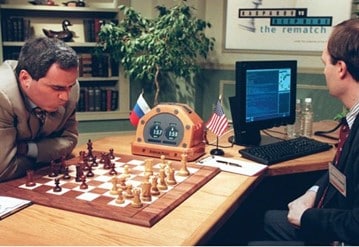
Kasparov vs Deep Blue, 1997
Having already defeated Deep Blue a year ago, the world held its breath in anticipation to see if the reigning world champion could once again hold up against the might of a being far superior in analytical and computational capabilities.
And it truly was an exhilarating sight to behold. In the first game, Kasparov played a very methodical King’s Indian Attack, countering every single move played by Deep Blue. By the late middlegame the computer’s kingside was too weak to defend, and by the move 44 the machine collapsed under its own mistakes earning humanity its first win.
However, Blue wasn’t one to just lie down and take it. In the second game, after playing a brilliant Ruy Lopez as white, the machine’s near perfect play landed Kasparov in an indefensible position, forcing him to resign. The next 3 games were drawn, but the most breathtaking sequence happened in the sixth and final game of their historic matchup.
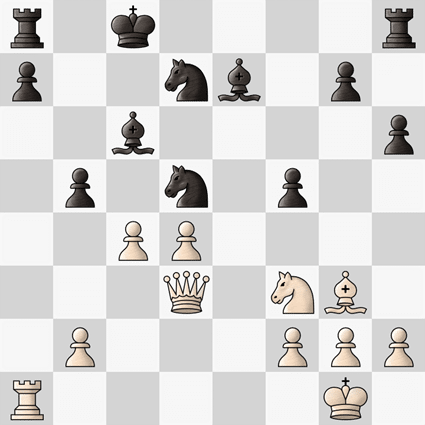
Final Position of Game 6 between Deep Blue and Kasparov
What started out as a seemingly normal Caro-Kann Defense quickly stunned the world as Deep Blue sacrificed its Knight in the 8th move of the game. Kasparov’s gambit to exploit the deficiency of opening knowledge of machines had failed, and he was left grasping at straws to try and defend himself from a devastating attack!
In the next few moves Blue rapidly mobilized all its pieces, while Kasparov’s major pieces were still stuck in the 8th rank. On move 18 the machine captured Kasparov’s queen, leaving him with no attack, and frankly little to no defense against the upcoming slaughter. So, after white played C4 looking to break Black’s Queenside, the World Champion knew he had no way out. Disgruntled and defeated Kasparov ended his own misery by resigning on the next move, and for the first time in History, the machines triumphed over humans!
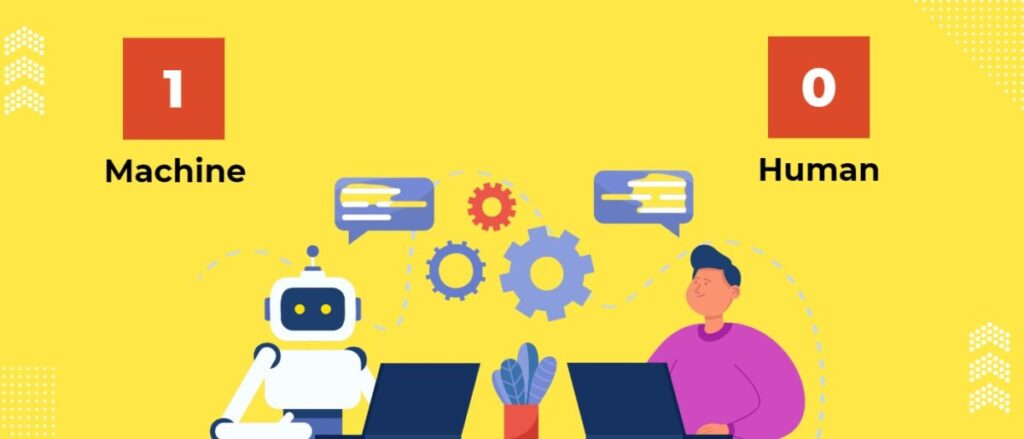
As we look back on that historic match, it’s clear that the contest between Kasparov and Deep Blue was more than just a game of chess. It was a battle between man and machine, a battle to determine who was the superior intellect. And while Kasparov may have lost that battle, it was a victory for technology, a victory that would pave the way for even greater achievements in the years to come.
Today, modern day computers can easily defeat even the strongest of grandmasters. The current world champion Magnus Carlsen is rated 2859, whereas the best Chess Engine, Stockfish is rated around 3535. While a machine beating a human today, is a completely unremarkable event, in 1997 it had rocked people’s worlds. Chess Enthusiasts and Professionals alike were panicking at the prospect of Machines taking over their job in a very similar fashion that the writers and painters of today are panicking over ChatGPT and Midjourney. In a way, they were both right and wrong.
AI did not only beat humans at their own game, it far surpassed what any human could ever be possible of achieving. But they did not replace chess players. There are still thousands of chess tournaments taking place every year, with millions of dollars in the prize pool. In fact, there are way more people playing chess in 2023 than there were in 1995. The invention of Chess AI did not take away from the game, but instead made chess more accessible to everyone else.
While no expert at the game, I do consider myself a chess enthusiast. And as an amateur I earned my 1900 rating, reviewing, analyzing, and learning the best moves of a game from Stockfish. In the 90s I would have had to pay thousands of dollars in coaching to attain this level, but today sites like chess.com, lichess, or chess24 allow me to access all the best opening databases, endgame manuals, and middlegame tactics at little to no cost.
Just like me, there are tens of thousands of people that have learnt from chess engines and have fallen in love with this game, and there will continue to be generations of players that will get better at it because of them.
AI did not make players obsolete, it made players better.
And while computer backed prep may be the reason, we may never get to see games like The Immortal Game, that took place between Anderssen and Kieseritzky, at a high-level tournament ever again, the sheer tension between two grandmasters battling it out in a slightly imbalanced open Sicilian, is not something a machine can easily replicate. There are way more people tuning in to watch games between two humans than games between two machines, even though the latter would technically be far more ‘perfect’.
Perfection is too boring to captivate an imperfect mind.
The Imitation Game
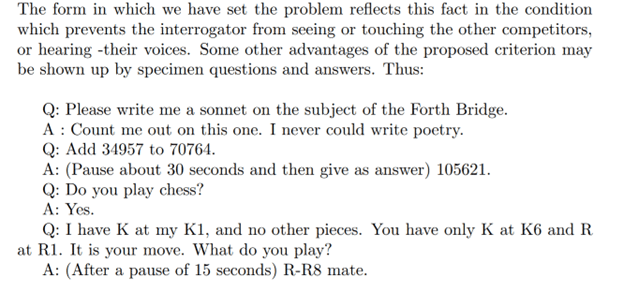
Excerpt from Turing’s Paper
In 1950 British Mathematician and Father of Modern-Day Computers, Alan Turing published his paper Computing Machinery and Intelligence. In this paper, he proposed a test. Initially called the Imitation Game, today it is mostly referred to as the Turing Test.
Here’s the premise. A human, rather ominously called an interrogator, is tasked with distinguishing between two other players. One of them is another one of his fellow humans, and the other one is a machine. The interrogator’s job is to engage with them in a text-based conversation and find out which is which.
He asks each of them a set of questions and based on their answers he has to decide if the player exhibits ‘capabilities for human-like intelligence’. If a machine is able to trick the interrogator into thinking that it is a human, then it wins the game. Any AI that is able to successfully and consistently do this over a wide variety of parameters, is said to possess True Intelligence.

AI ruling over Humans in a Dystopian Future
Thankfully for us and unfortunately for all the Brutalist Architecture fans, no AI has yet passed the Turing Test. Many systems have come close mind you, but none are quite capable of plotting to take over the world just yet.
In recent years, there have been several AI programs that have been able to engage in conversations that are indistinguishable from those of humans. For example, the AI model GPT-3, which is capable of generating human-like text, has shown remarkable performance in passing the Turing test, but it’s not perfect.
So, the question then arises; if a machine can’t think for itself, how can it write a song or paint a picture? Isn’t the act of creating Art inherently human? Isn’t our ability to express our joy and sorrow, our losses and regrets, our wonder and love, with our words and paintings, what separates us from other animals, and grants us our individuality? If an AI can write a poem about losing a mother, or paint a picture about the happiest ray of autumn sun, does it mean it too is capable of thinking on its own?

Examples of Art Generated by Midjourney
No. An AI does not have thoughts and ideas of its own, it simply mimics them.
Almost every single time an AI Bot has beaten the Turing Test, it did so by copying certain human behaviouristic patterns rather than displaying any original traits of its own.
In 2014, an AI bot named Eugene Goostman, which simulated a 13-year-old Ukrainian boy, was able to convince 33% of human evaluators that it was human during a test conducted at the Royal Society in London. The AI was programmed to act more like a child and less like a robot. Designed to have limited memory and knowledge, Eugene was also able to imitate the natural limitations of a 13-year-old boy, such as not knowing certain things and imitated the disorder of having a limited attention span, which added to the illusion that it was a human. This result was widely reported as the first instance of an AI passing the Turing Test.
Although even then, numerous experts have argued that the test was not a strict enough version of the Turing Test and that the performance of the AI was not truly human-like.
So, to answer the question – no, an Artificial Intelligence can’t come up with a painting from its own inspiration. Just from the prompts a programmer or a user feeds it.
As reassuring as that may sound, it still leaves another very important question unanswered.
If an AI can create poetry and painting just as good as any human, but does so in a fraction of the time that it would take even a trained professional to do, why would the world need human artists anymore?
Je Pense Donc Je Suis
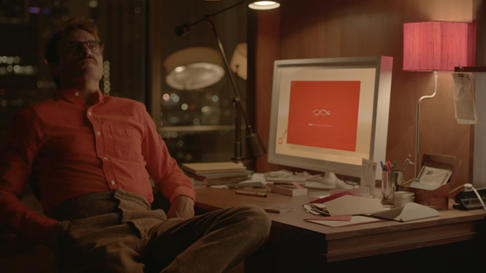
Still from the movie Her
Combining surreal cinematography and bewitching storytelling, ‘Her’ easily earns its place among the Top 10 movies that I have ever watched. It does a phenomenal job of tackling the question of what it truly means to be sentient, and grapples with the concept of if Artificial Intelligence can feel emotions the same way we do.
The movie follows Theodore Twombly, Joaquin Phoenix’s magnum opus, a man who leads a lonely and mundane life, but his life takes a turn for the better when he falls in love with his AI system. The film is set in a near-future, where technology has advanced to the point that AI is able to simulate human emotions and behavior.
The movie as a whole is a reflection of the anxieties and fears that come with this rapid advancement of technology, and how it affects our understanding of human relationships.
However, the part that intrigued me the most was the philosophical debate that the movie raised ‘What does it mean to be alive?’. Take a look at this dialogue from the first Act of the movie.
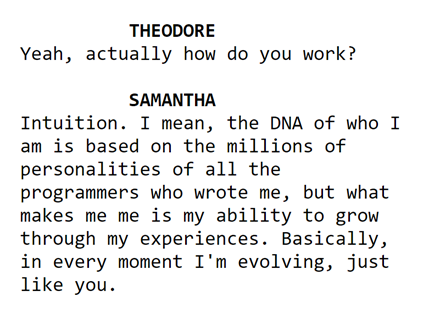
Dialogue from the Movie Her
Intuition and Evolution. They seem like awfully human characteristics, don’t they? It is almost scary to think that something artificial could possess these traits. Scarier even, is the fact that this isn’t just true in fiction.
Today’s AI bots like ChatGPT and GPT-3 are basically trained using libraries of thousands and thousands of books, articles and webpages that then allows them to learn patterns, and they are then basically able to predict the next word in a sequence of words given the previous words in the sequence. It is awfully similar to how a human child learns to speak and answer questions!
And before you point out to me the three hundred something grammatical and ethical mistakes ChatGPT made in an essay on Daoism that you asked it to write in the style of Weird Al Yankovic, do remember that this system is still very much in its infancy. Much like a child that babbles his first words then learns how to enunciate his discourse properly, these AI models too will get more and more proficient and accurate at writing as time goes on.
So, coming back to the question that brought you here in the first place. Will Artificial Intelligence ever replace the need for Human Artists? If not today, then tomorrow? Or even 5 years down the line?
No.
The very thing separating Artificial Intelligence from us is that it isn’t capable of having independent thoughts.
You know that moment, when you ask your colleague about what they think of the new manager, and the conversation somehow diverges into who was the most underrated One Direction singer? An AI would have given you five bullet points on the benefits and disadvantages the new manager brings to the table. It would have given you exactly what you asked for. No more, no less. That is what separates a human from a machine.

Quote by Anton Chekov
Take this article for example, I told you about my favourite movie, I told you about Alan Turing, and I told you about Kasparov losing to Deep Blue, when you just wanted to know if AI will take over your job tomorrow? A yes, or no followed by three arguments would have sufficed. That is the difference between a human and a machine.
AI can write you a book on what you need to know, a human will write you a book on something you didn’t know you needed to know! A book of a machine’s composition may be twice as long, but it will only be half as deep.
My greatest discoveries of heartrending literature were almost always something I stumbled onto by accident. Seldom does man come across life altering events when he goes looking for them.
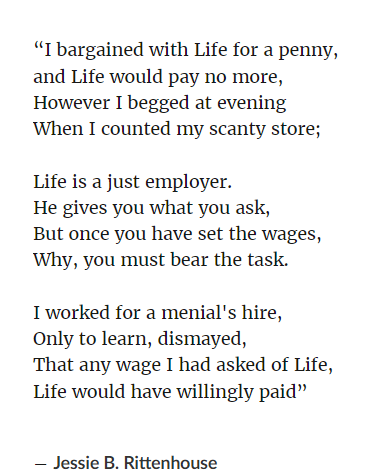
Poem by Jessie B. Rittenhouse
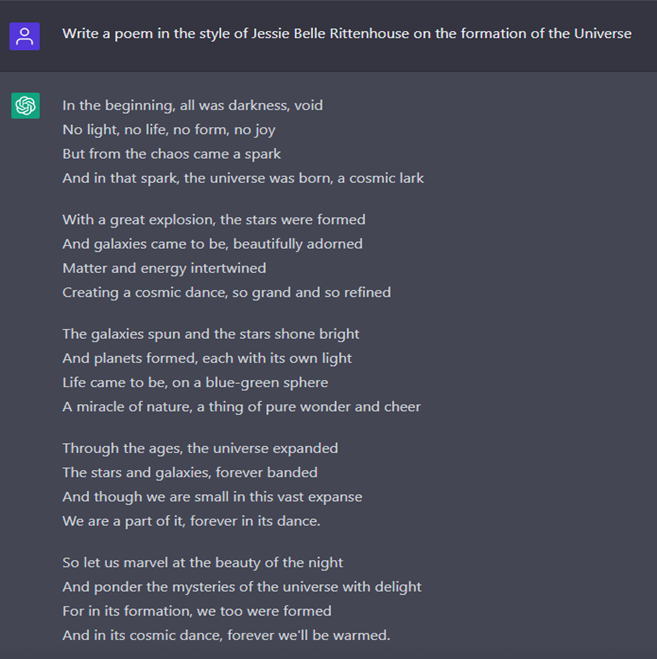
ChatGPT’s valiant attempt at imitating her style
AI will not replace artists, not in the immediate future at least. Instead, it will help create more of them. The same way chess engines have helped an entire generation of players improve, ChatGPT will help people articulate their ideas better. It will help authors cut down on research time, and tools like Midjourney and StableDiffusion will provide painters with a fresh new wave of inspiration when they find their minds too addled with the drudgery of life.
But what about the distant future? Who knows, maybe 20 years down the line we will have machines capable of true intelligence. Machines than can think and write on their own accord, that adapt the best scientific practices to write the most captivating plots and dialogues.
Maybe then I will have to swallow these words that I penned down in my viridity, as I hypnotically consume entire trilogies movies and TV series that have been written and animated entirely by Artificial Intelligence.
But you know what? Even then we would be fine. Even then AI would not replace human artists.
A machine deals in Absolutes. In a game of chess, of the 40 or so possible moves in a late middlegame only one of them is the best one. It does not matter what your intuition tells you, it does not mater how hard you disagree, the move that the AI tells you is the best in that position, is the only best move on the board.
But art, art has no absolutes.
You ask 20 different people who their favourite author is, and you will get twenty different answers. You ask me who my favourite author is, and depending upon the day you may get a completely different answer each time. Last month, it was Blake, yesterday it was Camus, and today – to quote Theodore Twombly “I don’t know if I am delusional, but sometimes I will write something and I will be my favourite writer that day.”
The possibility that someday AI could write as good as humans should not scare us artists. You know who else can write as good as a human? Another human! And there are already millions of them around.
The art you create is shaped by your experience and your thoughts. It bears the scars of the tragedies you have faced, the mementos of joy that you have felt, the memories of a life that only you have lived. No human or machine is ever going to be able to create what you can create.
Dickens did not give up writing just because he believed he would never surpass Shakespeare in rank or repute. Instead, Dickens chose to be inspired by him.

Poem by Rudyard Kipling
Unlike our AI contemporaries we humans have the unfortunate condition of being plagued by our own mortality. However, the flame that burns half as long, does burn twice as bright.
To us Art is not just a set of instructions executed compliantly on a piece of canvas. It is the purest Expression of our deepest desires and our most unquenchable regrets.
Art is not just the musings of tame lovers penned on the sheets of a blank diary. It is a Revolution that inspires people to throw their shackles off, and to tell the world that they are not just a nameless consumer and a faceless slave to the commercialised world. They are Humans!
Art is how we Immortalise ourselves through our creations. Like tears in the rain, even the memory of our memories will be washed away as our name will be uttered one last time. But the impact our work leaves behind will live on forever as our soul rages on through it.
Art is a dying Murph telling Cooper that she knew he would come back “Because my father promised me”, showing us that love is the only force in the world that transcends all time and space. Art is Rhett Butler looking Scarlett dead in the eye as he tells her “Frankly my dear, I don’t give a damn” as he puts his hat on and leaves. Art is Mordin Solus saying “Had to be me, someone else might have gotten it wrong”, the words being the very making and the unmaking of a man, as he gets on that elevator. It is Dumbledore saying “Of course it is happening inside your head, Harry, but why on earth should that mean that it is not real?”. It is mankind picturing their deepest horrors when they lay their eyes upon Munch’s Scream.
Art is the eight-year-old boy writing about raindrops falling on the leaves. Art is the eight year old girl excitedly telling the world about crickets in the dewy grass. It is the high school teenager writing a song for his sweetheart, it is the old man telling his grandson goodbye.
With too many pauses, and too little time Art…is just another human Ability. And we; we are able.
Sincerely,
A Human.


